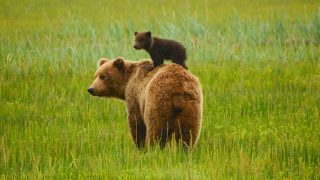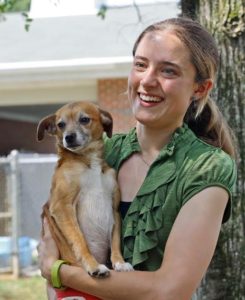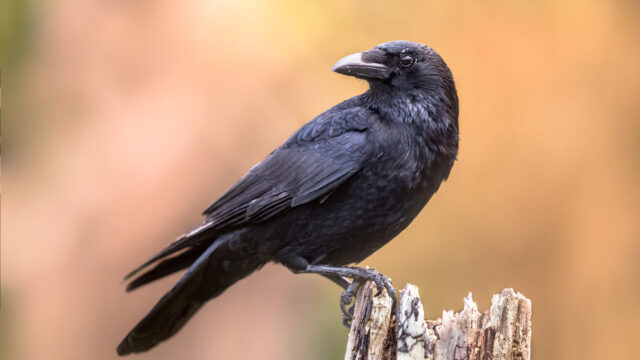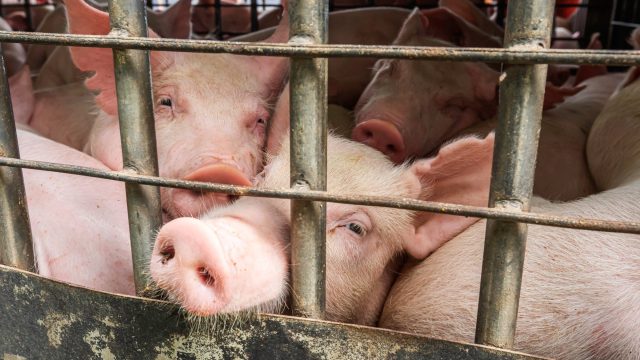
Where Are They Now? Spotlight on Elizabeth Overcash
In this continuing series of updates on former Student Animal Legal Defense Fund members, the Animal Legal Defense Fund is proud to spotlight graduates protecting animals through the legal system.

“My involvement with SALDF was undoubtedly the best part of my law school experience.” –Elizabeth Overcash
Current position and organization: Animal Shelter Manager at Burlington Animal Services in North Carolina.
How long have you been in your current position? Two years.
What do you do in your current position? As shelter manager, I manage the daily operations of Burlington Animal Services, a municipal, open-admission shelter responsible for all animals in Alamance County, North Carolina, which takes in approximately 5,000 animals per year. I monitor and respond to animals’ behavioral and/or medical needs, working closely with veterinary staff, and supervise the animal care staff. I ensure that animal care standards are consistently met, and I work to increase the number of animals released from the shelter alive by promoting adoptions, placing animals with nonprofit placement partners, and administering the shelter’s foster program. I also work with members of the community to assist pet owners and improve animal welfare in Alamance County.
Have you had any other work experiences in animal law (or animal protection generally) since graduating law school? After graduating from law school and before coming to Burlington Animal Services, I spent two years working in animal protection as an evidence analyst with People for the Ethical Treatment of Animal (PETA)’s Cruelty Investigations Department. As an evidence analyst, I reviewed investigator and witness reports and evidence from animal industry facilities and compared it against the controlling law to determine if there were legal violations. Upon finding any violations, I worked with federal, state and local agencies to ensure allegations were investigated. In one such case, I helped coordinate and execute California’s largest animal seizure of over 16,000 animals.
When did you take an interest in animals and, specifically, helping animals? I grew up with animals and have always had a respect for them. I became vegetarian in high school, after learning about the animal agriculture industry, but it was not until college that I took an active interest in animal welfare. As an undergraduate at the University of North Carolina at Chapel Hill, I led an animal welfare-related volunteer group called Helping Paws for three years, which also led me to begin volunteering at the local animal shelter. I enjoyed helping animals through volunteer activities connected to this group. More importantly, my involvement with Helping Paws allowed me the opportunity to meet several individuals who worked in animal welfare, including at the Humane Society of the United States, Vegan Outreach and Compassion Over Killing. These experiences helped me realize that working in animal welfare was not only a volunteer activity but also a viable career option.
What did you study in undergrad, and what school did you attend? I attended the University of North Carolina at Chapel Hill and majored in English and Spanish.
What got you interested in pursuing a law degree? I took and greatly enjoyed an undergraduate course in environmental law. This class sparked my interest in the law, and I believed that attending law school would best allow me to work toward improving the current situation of animal welfare.
Where did you go to law school? I attended the University of North Carolina School of Law.
When you were involved with SALDF, what position(s) did you hold and what sort of activities and events did you help with and/or spearhead? My first year with SALDF, I was the founder and the president; the second year, I held the position of vice president. I organized group activities including hosting speakers on animal law and animal welfare at Carolina Law, pro bono projects concerning animal legal issues, fundraisers, vegetarian and vegan food events and bringing shelter animals to campus. Our greatest accomplishment as a group was to host the first animal law symposium at Carolina Law, which UNC Law SALDF still continues to hold annually.
How did being involved with SALDF play a role in your education and career? Being involved with SALDF allowed me to immerse myself further into animal welfare and animal law, which confirmed for me that I wanted to pursue a career in animal welfare. I had the opportunity to explore current concerns related to animal welfare and possible ways to tackle these concerns. It also gave me the chance to lead others in animal welfare-related activities. My involvement with SALDF was undoubtedly the best part of my law school experience.
Any other noteworthy law school experiences, internships, etc.? My greatest accomplishment in law school was founding the SALDF group as well as successfully petitioning the law school for an animal law class. Additionally, I received the Animal Legal Defense Fund Advancement of Animal Law Scholarship, the Animal Legal and Historical Center research grant and a year-long clerkship with the Animal Legal Defense Fund’s Litigation Program—each of which allowed me to research animal law and its practical applications.
What do you hope to accomplish in your work for animals (and/or is there an accomplishment thus far you are particularly proud of)? At PETA, I worked to improve the quality of animal lives on a national level. At Burlington Animal Services, I am doing all that I can to improve animal lives on local level. What I hope to accomplish in my career and what I hope I have accomplished in my past experiences is to make a notable improvement in the lives of animals and to encourage others to see and understand the need for such improvement.
What advice would you give law students who are considering a career in animal law? I think what gives most law students pause about pursuing a career in animal law is that the pathway to such a career is not always apparent. I would encourage students interested in animal law to understand that there are in fact numerous ways to enter the field of animal law and have a successful career in that field. Speaking with any of the countless individuals in this field is an ideal way for students to begin understanding the opportunities in the field and what direction they may want to pursue.
How We Work
Recent News
-
California: Ban Cruel Octopus Farming!
Ask your state assemblymember to support the California Oppose Cruelty to Octopuses (OCTO) Act (A.B. 3162) to protect octopuses and marine ecosystems. -
Animal Legal Defense Fund Grant Supported Washington Attorney General’s Enforcement of Animal Cruelty Law
The judge sentenced a Snohomish County resident for killing then displaying neighborhood wildlife and shooting a kitten in the eye.April 18, 2024 News -
Animal Law Symposium 2024: State Confinement Laws and the Future of Farmed Animal Policy
All sessions are now available on demand!April 16, 2024 Article



